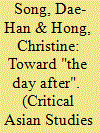|
|
|
Sort Order |
|
|
|
Items / Page
|
|
|
|
|
|
|
| Srl | Item |
| 1 |
ID:
125166


|
|
|
|
|
| Publication |
2013.
|
| Summary/Abstract |
Turning on the logic of the spectacle, U.S.-based campaigns on North Korean human rights, in calling for intervention, have wielded two images aimed at outing North Korea's "hidden truths"? the image of the starving child circa the 1990s and the contemporary satellite image of what appear to be labor camps. Focusing on the use of online virtual geo-imagery programs like Google Earth in the human rights mapping of North Korea, this essay situates post-9/11 "liberation technology" within the framework of the unending Korean War, a war whose failed "liberation" of Korea from the global forces of communism haunts North Korean human rights critique today. By examining mid-century bomber photographs and contemporary human rights satellite images of North Korea, this essay inquires into the homology between technologies of militarized intelligence and war, on the one hand, and technologies of human rights that aim to expose North Korea, on the other. Both modes of apperception, this essay argues, strive to delegitimize and destroy rather than faithfully represent the enemy.
|
|
|
|
|
|
|
|
|
|
|
|
|
|
|
|
| 2 |
ID:
125161


|
|
|
|
|
| Publication |
2013.
|
| Summary/Abstract |
Introducing the core concerns animating this two-part thematic issue of Critical Asian Studies (December 2013 and March 2014), this essay offers a historicized overview of the consolidation of contemporary human rights as the dominant lingua franca for social justice projects today. Highlighting what the rights framework renders legible as well as what it consigns to unintelligibility, this essay examines the antinomies of contemporary human rights as an ethico-political discourse that strives to reassert the dominance of the global North over the global South. Relentlessly presentist in its assignment of blame and politically harnessed to a regime-change agenda, the human rights framing of North Korea has enabled human rights advocates, typically "beneficiaries of past injustice," to assume a moralizing, implicitly violent posture toward a "regime" commonsensically understood to be "evil." Cordoning off North Korea's alleged crimes for discrete consideration while turning a willfully blind eye to the violence of sanctions, "humanitarian" intervention, and the withholding of humanitarian and developmental aid, the North Korean human rights project has allowed a spectrum of political actors-U.S. soft-power institutions, thinly renovated cold war defense organizations, hawks of both neoconservative and liberal varieties, conservative evangelicals, anticommunist Koreans in South Korea and the diaspora, and North Korean defectors-to join together in common cause. This thematic issue, by contrast, enables a range of critical perspectives-from U.S.- and South Korea-based scholars, policy analysts, and social justice advocates-to attend to what has hovered outside or been marginalized within the dominant human rights framing of North Korea as a narrowly inculpatory, normative structure.
|
|
|
|
|
|
|
|
|
|
|
|
|
|
|
|
| 3 |
ID:
127763


|
|
|
|
|
| Publication |
2014.
|
| Summary/Abstract |
Since 1998, the National Endowment for Democracy (NED), a quasi-private, grant-making organization funded almost entirely by the U.S. Congress via the U.S. State Department, has been, directly or indirectly through its four core institutes, supporting right-wing, neoconservative South Korean human rights and defector groups. In addition to technical assistance, this support has included $6.7 to $11.9 million from 1999 to 2010, with an additional $3 million starting January 2009 directly disbursed to many of these groups by the State Department under then newly elected Barack Obama. This article contends that NED's "human rights" work is part of a much larger strategy of destabilizing the North Korean government in line with U.S. interventionist aims against its foes. By funding international conferences and defector critiques of North Korea (including strategic testimony provided before Congress in the push for passage of the North Korean Human Rights Act of 2004), NED has fostered a North Korean human rights knowledge economy that has substantially shaped public images and opinion about North Korea in South Korea, the United States, and around the world. At the same time, NED's radio broadcasting, propaganda leaflet drops, and other incursionary media have sought to sow discord in North Korea.
|
|
|
|
|
|
|
|
|
|
|
|
|
|
|
|
|
|
|
|
|